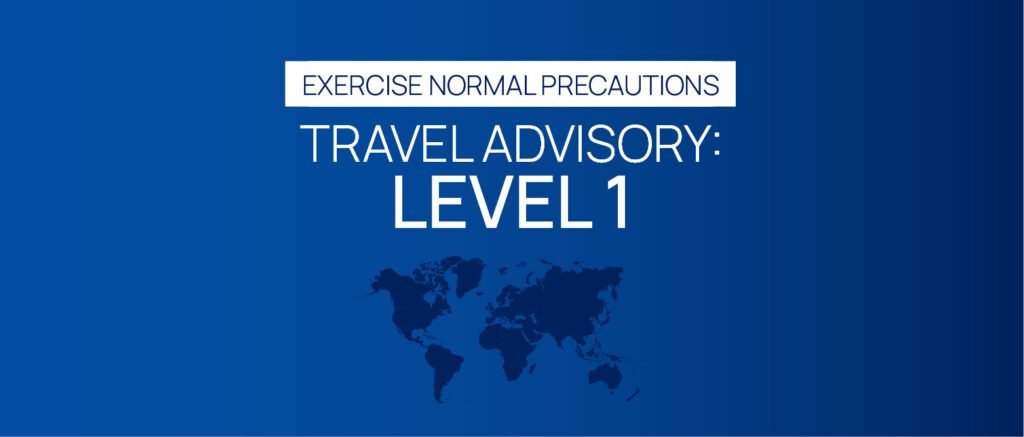In a remarkable shift, El Salvador has garnered global attention with the U.S. Department of State’s recent decision to elevate the country to its safest travel advisory level, Level 1: “Exercise Normal Precautions.” This move places El Salvador ahead of several well-known global destinations, including Mexico, Germany, Russia, France, India, the United Arab Emirates (UAE), Israel, and the United Kingdom (UK). These countries, despite their significance in the world economy and tourism, continue to hold higher advisory levels due to various ongoing concerns. El Salvador’s elevation is a testament to its impressive strides in improving safety, marking a major transformation for the Central American nation.
Understanding the U.S. Travel Advisory System
The U.S. State Department issues travel advisories to inform U.S. citizens about the safety of traveling to foreign countries. The advisory system is divided into four levels:
- Level 1: Exercise Normal Precautions – This is the safest level, indicating that there are no significant risks to travelers, and they are advised to exercise standard caution, similar to traveling within the U.S.
- Level 2: Exercise Increased Caution – This level signals that travelers should be more aware of potential risks, such as political instability or higher crime rates.
- Level 3: Reconsider Travel – This level indicates serious concerns, including the possibility of violent crime, civil unrest, or health risks.
- Level 4: Do Not Travel – The highest advisory, this level is reserved for countries facing extreme threats, including ongoing war or other severe conditions that make travel highly dangerous.
The shift of El Salvador to Level 1 highlights the country’s improved security situation, allowing travelers to visit with standard precautions. It contrasts sharply with several other nations that remain at higher levels of advisories.

El Salvador’s Remarkable Transformation
El Salvador’s elevation to Level 1 is largely attributed to President Nayib Bukele’s aggressive efforts to tackle crime and improve security in the country. The nation’s previous reputation for gang violence and drug trafficking posed significant challenges to both local residents and foreign visitors. However, in recent years, El Salvador has experienced significant improvements, particularly since Bukele took office in 2019.
The turning point came with Bukele’s introduction of the Territorial Control Plan, a comprehensive strategy designed to combat gang violence and criminal activity. The plan involved extensive operations by the Salvadoran military and police forces, which sought to take back territories controlled by violent criminal organizations. Along with the Territorial Control Plan, Bukele declared a state of exception in 2022, allowing law enforcement to operate with broader powers and arrest suspected gang members without warrants. These measures led to the capture of thousands of gang members, drastically reducing violence in many regions of the country.

Moreover, El Salvador’s investment in improving its judicial system, infrastructure, and public services has contributed to a more stable environment. While the country is not entirely free from risks, the combination of stringent security measures and government reforms has contributed to a remarkable turnaround.
The U.S. State Department’s decision to place El Salvador at Level 1 is based on these significant improvements, which have made the country much safer for foreign nationals. This shift represents a broader recognition of the positive changes El Salvador has undergone in recent years.
Comparative Analysis: Where Other Nations Stand
While El Salvador celebrates its rise to Level 1, several countries with prominent global standing continue to have higher travel advisories. These nations are deemed to present greater risks to travelers due to ongoing conflicts, political instability, or other concerns. Here is a breakdown of the current advisory levels for some countries that have attracted attention in comparison to El Salvador’s newfound status:
- Mexico: Despite its proximity to the United States and its popularity as a tourist destination, Mexico continues to face serious challenges with drug-related violence, organized crime, and kidnappings. The U.S. government has issued travel advisories for certain regions in Mexico, especially those plagued by cartel activity. Some areas remain under Level 3 or even Level 4 advisories. Travelers are advised to exercise caution and avoid specific regions known for high crime rates.
- Germany: Germany, a major European hub, remains at Level 2: “Exercise Increased Caution.” While Germany is one of the safest countries in Europe, it faces risks from terrorism, especially in major cities. The U.S. advisory highlights the potential for terrorist attacks, and while overall safety remains high, visitors are encouraged to stay vigilant in crowded public areas and events.
- Russia: Russia has been placed under Level 4: “Do Not Travel,” largely due to its ongoing involvement in military conflicts, most notably the war in Ukraine. This conflict has led to severe geopolitical instability, which poses significant risks to foreigners, especially those in areas affected by the conflict. The U.S. government has strongly advised against any travel to Russia due to the potential dangers.
- France: France, like Germany, remains at Level 2 due to risks associated with terrorism and civil unrest. While the country is still a major tourist destination, it is not without its challenges. Recent attacks in major cities have heightened security measures, and visitors are advised to remain cautious in busy urban centers.
- India: India holds a Level 2 advisory, which reflects the presence of potential risks like political instability, civil unrest, and terrorism. While India remains a popular destination for cultural tourism, certain areas have experienced communal violence, and travelers are advised to exercise caution in specific regions.
- United Arab Emirates (UAE): The UAE, known for its modern infrastructure and status as a financial hub, is also at Level 2. While it is generally safe for visitors, there are concerns about potential regional tensions and the safety of foreign nationals in times of unrest. Additionally, the UAE has been linked to various geopolitical conflicts in the Middle East, which contributes to its higher advisory level.
- Israel: Israel’s security situation is volatile due to ongoing conflicts in the region. The U.S. State Department has placed Israel at Level 2, advising travelers to remain vigilant due to the risk of terrorism and potential conflict in Gaza and the West Bank. Visitors are urged to follow security guidelines and avoid certain high-risk areas.
- United Kingdom (UK): The UK, a key global financial center, is also at Level 2. While it remains largely safe for travelers, the risk of terrorism, particularly in urban areas, continues to warrant caution. The UK has faced a number of terrorist incidents in recent years, prompting heightened security measures.
Why This Matters for Travelers
El Salvador’s transition to Level 1 is significant because it shifts the global perception of the country. With gang violence and instability previously casting a shadow over its tourism industry, the Level 1 advisory opens the door for new opportunities, both for travelers and for the country’s economy. Tourism is an essential part of El Salvador’s economy, and the reduced security risks will likely boost international arrivals, from those seeking to experience its stunning landscapes to those interested in its vibrant culture.
This elevation is also a reflection of President Bukele’s successful approach to governance, showing how a focused strategy, political will, and collaboration between government bodies can lead to tangible results in improving national security. His administration has demonstrated that with the right policies and firm leadership, even countries once plagued by insecurity can become attractive destinations for tourists.
Conclusion
El Salvador’s rise to Level 1 status marks a new chapter in the nation’s history and underscores the positive effects of strong governance and comprehensive security measures. In a world where safety is a growing concern for travelers, the U.S. travel advisory plays a critical role in guiding decisions. El Salvador’s newfound safety reflects not only the country’s transformation but also the power of effective leadership in overcoming challenges. For travelers looking to explore a country with much to offer, El Salvador is now a more attractive and secure option, signaling its growing prominence on the global stage.
Do follow Uae stories for more Updates












